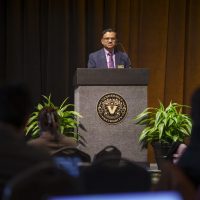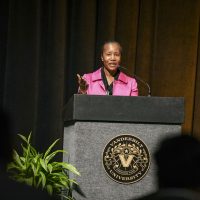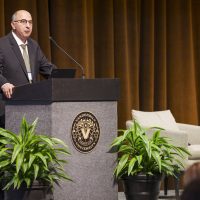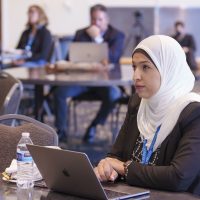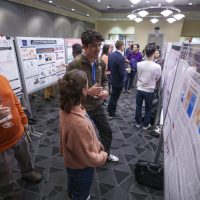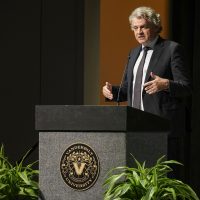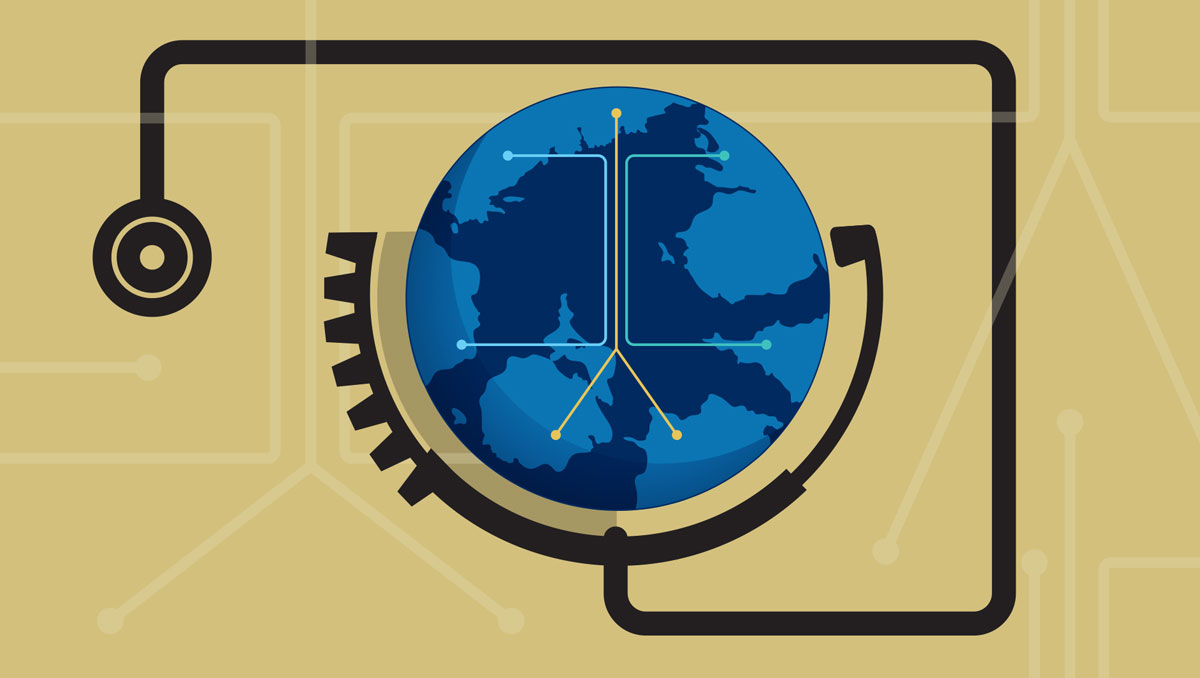Researchers from around the globe gathered for the inaugural Nature conference “Bioengineering for Global Health” at Vanderbilt University Nov. 13–15. Faculty members from the Department of Biomedical Engineering and editors from Nature Communications, Nature Biomedical Engineering and Nature Reviews Bioengineering led the organization of the conference.
About 130 participants discussed advances in diagnostic, treatment and disease-monitoring platforms that can function in diverse settings, particularly in places where resources are scarce. Featured speakers included Chancellor Daniel Diermeier and Nature Editor in Chief Magdalena Skipper. Conference speakers represented numerous countries, including India, South Korea, Brazil, China, South Africa, Spain and Scotland.
Krishnendu Roy, Bruce and Bridgitt Evans Dean of Engineering and University Distinguished Professor, provided opening remarks, and there was a welcome address by Michael Miga, the interim chair of the Department of Biomedical Engineering.
“This is really a global conference,” said Roy, whose research is focused on engineering biomaterials for delivering vaccines and immunotherapies. “We are working together on what our chancellor likes to call radical collaboration, not just across the disciplines, but across communities. And you are part of that tremendous global community that we want to collaborate with.”
Among the highlights of the conference were presentations from Skipper and Manu Platt, director of the BETA Center at the National Institutes of Health, during a session on funding and publishing global health-related bioengineering research. Charleson Bell, BE’07, MS’09, PhD’15, director of entrepreneurship and biomedical innovation at the Wond’ry, Vanderbilt’s Innovation Center, gave a presentation on commercialization and what the Wond’ry has to offer.
“Innovation is positive value change,” said Bell, who also is research assistant professor of biomedical engineering. “If you’re trying to create positive value change, you have a place here to do that.”
After their presentations, Skipper, Platt and Bell participated in a panel discussion and fielded questions from attendees on topics that ranged from getting funding to dealing with failure. As for the latter, all three presenters said not to fear failing, but to use it as a motivator when it happens.
“Everyone fails at some stage, especially the early-career colleagues in the room,” Skipper said. “For me, the trick is how do you approach it? How do you learn from that failure; how do you approach other similar situations in a new way?”
In the case of funding, Platt said even top researchers are sometimes rejected.
“There’s nothing I think that is more communal than seeing the name of someone who’s super famous, super successful, highly funded—and their proposal will not even be discussed, meaning they’re in the bottom 50 percent,” Platt added. “It just says this happens to everyone.”
Other current Vanderbilt-affiliated researchers and alumni who presented at the conference included:
- Xiaoguang Dong, assistant professor of mechanical engineering, presented a new study on a robotic ciliary system to remove excessive mucus in airway stents
- Nabil Simaan, professor of mechanical engineering, presented work on robot-assisted training aimed at scaling the availability of surgical care in developing countries
- Carol Ziegler, MSN’06, DNP’12, professor at the Vanderbilt School of Nursing and co-founder of the Climate, Health, and Energy Equity Lab, discussed bringing bioengineering research into clinical settings
- Kit Parker, MS’93, PhD’98, who is the Tarr Family Professor at Harvard University, spoke about on-demand manufacturing of heart valves
In one of the final sessions, panelists were asked their interpretation of “scientific impact,” and responses included: persistence in translating work into viable solutions; passing knowledge to the next generation; more collaboration among fields; and mentoring.
“It was wonderful to gather such an esteemed, international audience to talk about the amazing work they are doing to improve global health,” said Audrey Bowden, the conference’s lead planner, Vanderbilt associate professor of biomedical and electrical engineering and Dorothy J. Wingfield Phillips Chancellor’s Faculty Fellow. “It is vital to develop tools that can accurately detect, diagnose and treat disease, as well as work to overcome cultural barriers and ensure equitable access to that technology. I saw a passion at the conference to do these things, and I’m excited about the future.”
In closing remarks, Diermeier thanked the researchers for coming to Vanderbilt and encouraged them to continue collaborations and strive to be impactful.
“If your experience in Nashville and our campus has inspired and energized you, and helped advance you in your work, I hope you will take it back to your home cities and tell them about what you saw and experienced here,” he said. “We want to bring more of the world to Vanderbilt, and we want to bring more of Vanderbilt to the world—because working with others worldwide on global challenges is the greatest way to have an impact on the issues that matter most.”
Yajur Maker, a fourth-year M.D./Ph.D. student at Rice University, said the conference was inspirational.
“I have peers around the world who are doing amazing global health work,” Maker said. “I’m excited to have the opportunity to network with these folks, learn more about what they’re doing and see if there are areas for collaboration.”
